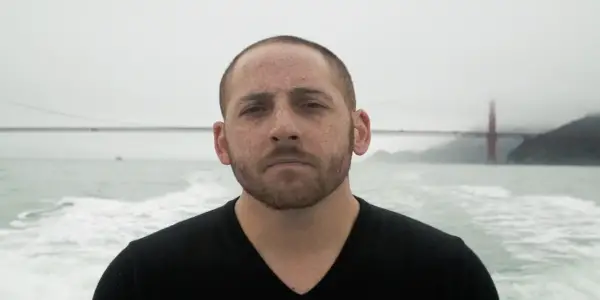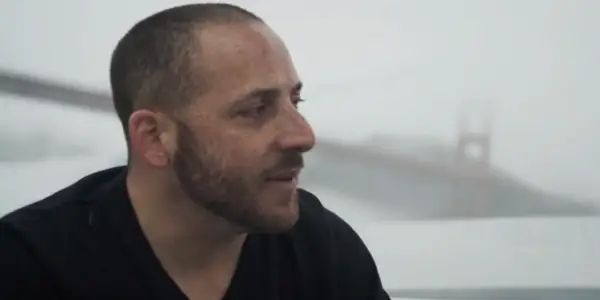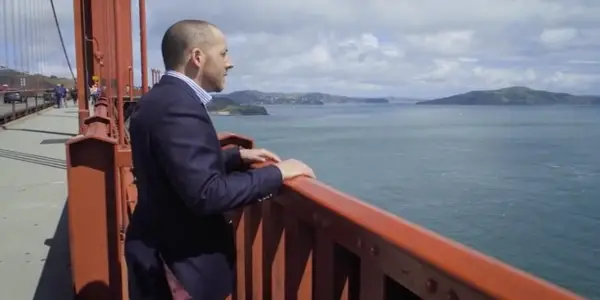SUICIDE: THE RIPPLE EFFECT: A Profound Journey After Suicide Survival

Jacqui Blue has a lifetime background in theater and writing.…
Suicide is a controversial topic but it needs to be discussed. At the age of 19, Kevin Hines jumped from the Golden Gate Bridge and attempted to kill himself but survived. Suicide: The Ripple Effect is his story and the story about how the continuation of his life, with the courage to speak about his death wish, has touched others. The feature length, two hour and fourteen minute, documentary was directed by Kevin Hines and Greg Dicharry.
Talking the Talk
Suicide: The Ripple Effect lays out Kevin Hines’ very personal story, which is his truth that he unabashedly shares with the world on a regular basis, with the intent to make a difference and help others like him. He shares his own experiences with bipolar disorder, describing how he felt alone and like no one cared about him. He speaks openly about his diagnosis and how it has affected his life, but not just his life; also the lives of those closest to him.

He talks about his life before and after the jump including what was going through his mind during and seconds following the jump; in his moment of regret. He interviews the rescue workers and hospital staff who tended to him when he was brought in. Kevin is honest, sincere and raw in telling his tale.
Kevin talks about the feelings of anger some of his family and friends expressed after his suicide attempt. He and his father talk on camera about how his father stayed by Kevin’s side for weeks. He interviews his sister and wife, in addition to numerous other people close to him, as well as strangers who tell him how his story saved or changed their lives. Kevin takes the audience to visit milestones in his life and people who had an impact on him in one way or another. He takes the film crew back to his high school where he discusses a theater teacher who took his life and the impact that had on the students and staff left behind.
This film examines the activism by The Bridge Foundation that led to the building of a suicide prevention net on the Golden Gate Bridge, which is the suicide capital in the United States claiming over an estimated of 2,000 lives, many of those bodies never to be recovered. Kevin himself became an advocate who went on television to talk about the suicide prevention net.
Kevin spends a great deal of time talking to people who have been suicidal, people with mental illness, people who lost someone they love to suicide as well as people who work in the field of mental wellness and suicide prevention. He goes out of his way to get people talking about suicide in a candid but real and honest way. People in the film appear to open up easily to Kevin as he comes off as an understanding and compassionate guy who genuinely wants to see wellness instead of illness spread through humanity.

Walking the Walk
Kevin has become a public speaker who travels all over the world and shares his story with as many people as he can. He didn’t really want to die and he doesn’t believe a lot of people who attempt suicide actually want to die but instead they just want to be helped, be heard, feel loved, feel less lonely and get the proper treatment they need, if they happen to need it. He goes on talk shows and has made himself a force to be reckoned with in the battle for mental wellness.
Instead of referring to it as mental illness, I liked that this film took terminology into account and used the term “mental wellness” throughout. The great take-away from this documentary is that we all need to look out for each other. Millions of people are diagnosed, misdiagnosed, treated and neglected for mental and behavioral health issues every day. Some die from these unaddressed or neglected mental health issues and Kevin Hines was almost one of them. Now his mission is to help others who might be where he once was.
They also explored the documentary The Bridge (2006) which caught flak for capturing jumpers as they leaped to their deaths. Kevin interviewed the director, Eric Steel of The Bridge and they discussed what was going on and why it was important to capture it. Kevin takes the film to a suicide prevention call center in Georgia and to suicide prevention advocates in Australia, showing this is an International crisis not exclusive to America, despite the fact that in America we’re losing around 42,000 to suicide every year with rates increasing rather than decreasing.

Down To The Nitty Gritty
The film has high production quality, good sound and technically speaking is well done, start to finish. It’s edited well, even though it runs long, with a total run time over two hours. However, the film unpacks a lot regarding mental wellness, suicide and hope.
I didn’t agree with everything that is said in the film. One man says he doesn’t believe that suicide is a contagion but studies have shown that it is and suicide experts have been warning of it for some time. Aside from a few misleading statements, there isn’t a lot to nit-pick about Suicide: The Ripple Effect, as this is someone’s personal, real life story and the journey that he found himself on afterwards, when he reclaimed his life.
Kevin made this documentary seventeen years after he made an attempt on his life. This film is one chapter in the larger discussion our society needs to have about suicide.
Would you be interested in watching Suicide: The Ripple Effect? Tell us your thoughts in the comments below!
Suicide: The Ripple Effect was part of the ReelAbilities Film Festival, which is dedicated to promoting awareness and appreciation of the lives, stories and artistic expressions of people with different disabilities.
https://www.youtube.com/watch?v=JtYHVW94aio
Does content like this matter to you?
Become a Member and support film journalism. Unlock access to all of Film Inquiry`s great articles. Join a community of like-minded readers who are passionate about cinema - get access to our private members Network, give back to independent filmmakers, and more.
Jacqui Blue has a lifetime background in theater and writing. After achieving international acclaim with her first film Beautiful Births, she was one of 10 Directors selected by James Franco for his Master Class, "Sex Scenes". She went on to work with Jared Padalecki & T.O.N.E-z in her suicide awareness documentary, I Chose Life: Stories of Suicide & Survival and appears on-screen next to Lou Diamond Phillips in The Last Train. www.jacquiblue.net












